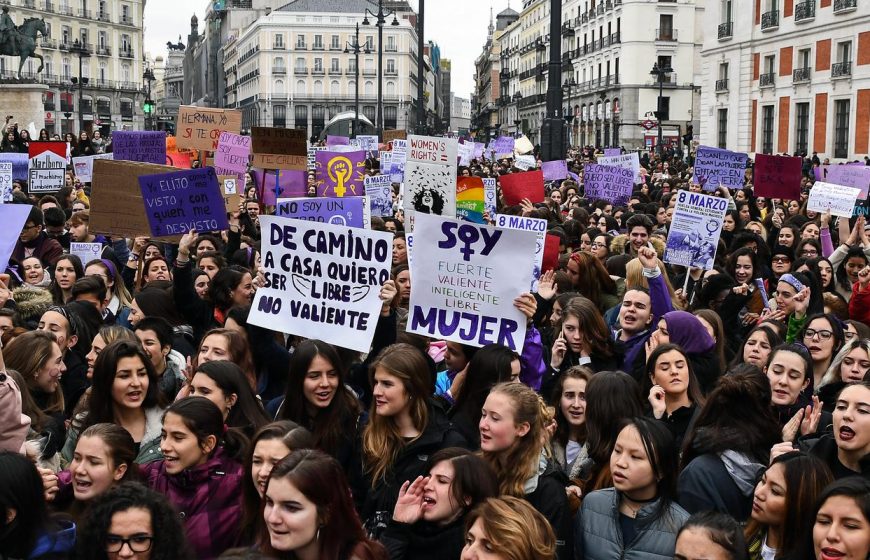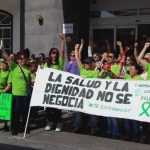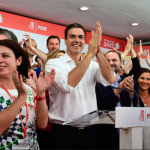THE CHANGE OF GOVERNMENT IN SPAIN, THE CONSOLIDATION OF THE LEFT ACCORD AND THE INTERVENTION OF THE MASSES – The fall of the Rajoy government came from factors like the disaggregation of the Popular Party – its corruption evidencing its debility – and the crisis of the right wing. The most decisive element behind this change, however, is the constant and permanent intervention of the masses.

The new Prime Minister Pedro Sanchez is the president of the Socialist Party (PSOE). A no-confidence vote brought Sanchez to government (6.1.18) along with the formation of a Front of left parties and nationalist sectors. This expressed the discontent and rebellion of people in large sections of society, and it precipitated the decomposition of the Popular Party (PP).
The masses repudiate the anti-social measures slapped on education, health, pensions, the right to work, the social rights, the freedoms of expression, etc. Following a 6-year gestation period, the movement “Marea Pensionista” [1] flooded the streets with thousands of indignant retirees (23.2.2018). After having kept the pensions frozen, the government decided to increase them by 0.25% in 2018. The cost of living rose by more than 2% however. Many seniors must ‘make do’ with 600 Euros a month, but a pension does not cover for all the basic needs. A sign of things to come was given in some big towns, as in Bilbao (capital of the Basque country), were the tide of pensioner-demonstrators started in the hundreds and finished in the tens of thousands. In such a social climate, the Basque Nationalist Party (EAJ-PNB) had no choice but to support the ‘no-confidence’ vote in parliament. [2]
Against Rajoy’s policies of austerity, the masses responded with huge mobilisations.
The climate of rebellion in the country culminated with the Women’s Strike and the 8th of March mobilisations. The women demanded equal rights for men and women. They condemned patriarchy and opposed capitalism. This was a class strike on a world level, with huge demonstrations in the United States and Latin America.
A situation of dual power is gripping society. As part of the functioning of the capitalist system, women are permanently faced with all forms of gender violence. This is encouraged by the political permissiveness of capitalism at all levels, from [the department of] justice to the repressive apparatus.
Capitalist violence is crudest in its treatment of the most vulnerable – like the women, like the immigrants. They all want to be recognised as citizens, with full rights. The immigrants want to regularise their situations to gain access to work, welfare, housing, education. To defend those rights, they barricade themselves in certain buildings [3]. Such actions have been going on for months, and in many towns. Supported by the Trade Unions and the social organisations, they create joint assemblies, rallies and other events. In Catalonia, their action was so effective that the president of the Generalitat (the Catalan government) and the woman Mayor of Barcelona turned up to visit them, listened to their demands and made promises where they thought they could help.
There are many other struggles besides these social mobilisations. The Food Platform Workers has been on strikes and protests, as well as the workers of the meat industry where super-exploited immigrants are engaged. There have been actions at Amazon (large delivery company) and at H&M (multinational of the clothing industry). There were strikes at the steel plant of Cadiz, other strikes amongst the dockers [4] and the taxi drivers are rejecting the ‘uberisation’ of their sectors. Social confrontation has markedly increased in the country. If the movement has not reached the bigger companies, it is entirely due to the conciliatory policies of the main Trade Union leaderships.
The new government seeks social improvement :

The new government led by the Socialist Party is not strong. Because of its slight parliamentary weight, it may be forced to negotiate important measures with nationalist bourgeois allies. It has no plan to abolish the Labour Law [5], but it wants to change some of its aspects responsible for the present situation. The Sanchez government wants to restore the right to public health for everyone – undocumented persons included – which the PP had suppressed. About the Law of Historical Memory [6] : it will have Franco’s remnants removed from ‘El Valle de los Caïdos’ where the monument, built by the labour of Republican prisoners, is used for the exaltation of Francoism.
The Pedro Sanchez’ government has improved Spain’s immigration policy by allowing the Aquarius to dock, along with boats of immigrants turned away by the Italian government. There is a new government in Catalonia too. To normalise relations with it, Madrid has lifted Article 155 of the Constitution. As a result, Catalonia can now dispose of public funds. These changes are favourable to détente between the two governments, with the possibility of more accords to come. Now Pedro Sanchez announces his intention to transfer to Catalonia the Catalan prisoners presently in Spanish jails. This is another important element favourable to dialogue.
Podemos proposes a joint road-map with the PSOE :
The Party Podemos played an important part in getting the no-confidence vote passed. This opens a new stage in Spain. The Podemos leadership of Pablo Iglesias proposes that the PSOE lifts all the vetoes slapped by the Rajoy government on the Podemos’ parliamentary initiatives. Podemos proposes a joint road-map along following lines:
-
Automatic pensions rise.
-
Equal maternity and paternity leave.
-
A State Pact to counter machismo violence.
-
The State to recover all bailout monies from the banks.
-
Derogation from the “Ley Mordaza” – a ‘gag law’ that suppresses certain types of public protests. Supposedly for ‘security’, it has led to the arrest of many Trade Unionists, artists, singers and others.
-
A minimum inter-professional wage of 1,000 Euros pm.
-
Close all the immigration detention centres.



















